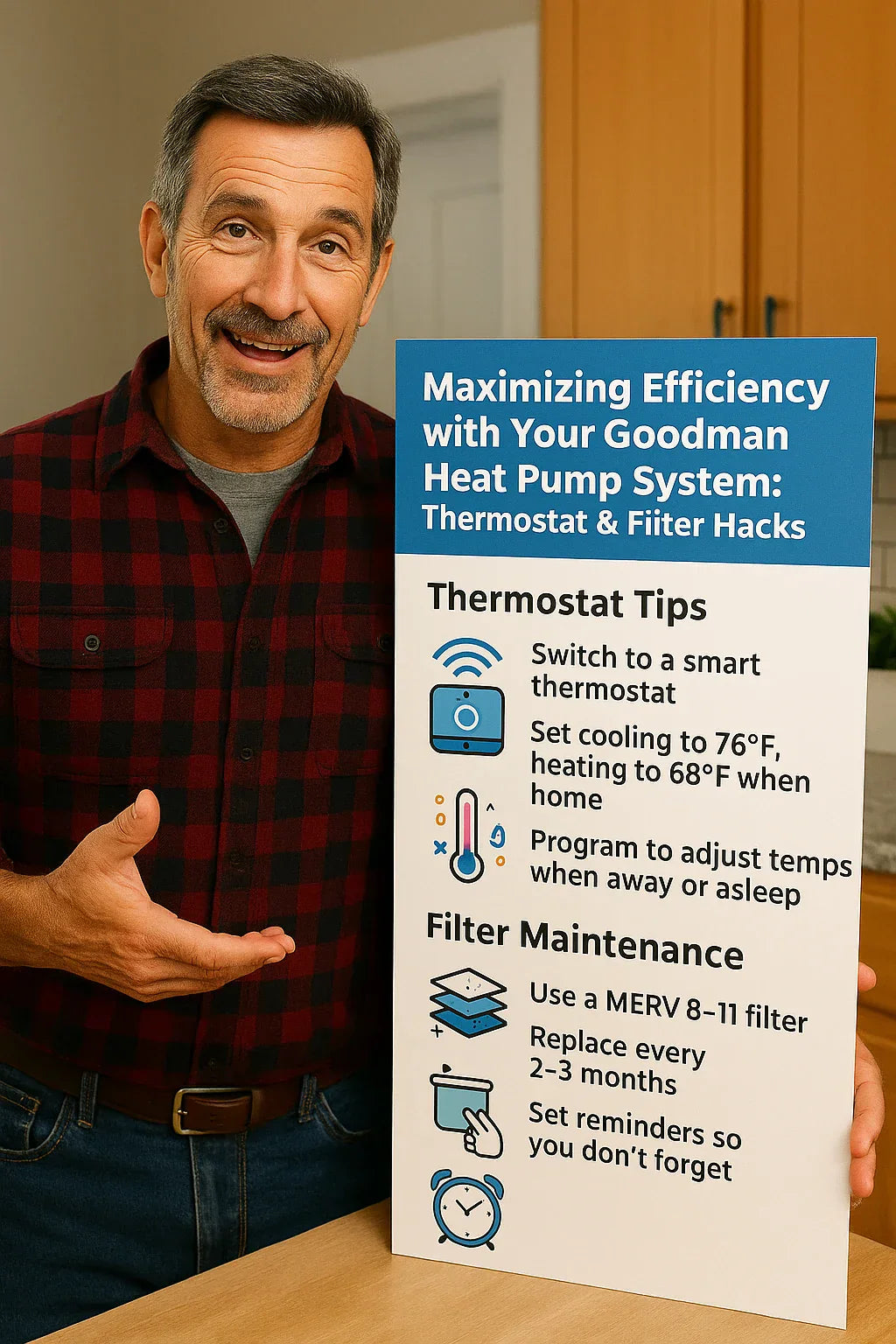By Mike Sanders, HVAC Expert
So you’ve invested in a high-performance HVAC system—like the Goodman GLZS4BA3610 3 Ton 15.2 SEER2 heat pump with the AMST36CU1300 air handler. You’re saving money and staying comfortable year-round… or are you?
Even the most efficient HVAC systems can underperform if you’re not optimizing how they run. That’s why today we’re diving into the two most overlooked yet impactful efficiency tools in your home:
-
Your thermostat
-
Your filter maintenance habits
This guide walks you through the best practices, expert-level hacks, and smart automation strategies to get every penny’s worth from your Goodman heat pump system in 2025 and beyond.
🎛️ Part 1: Thermostat Hacks for Peak Performance
Your thermostat isn’t just a dial—it’s your HVAC command center. And the smarter your thermostat strategy, the less your system has to work (and the more you save).
🔧 Thermostat Type Breakdown
| Thermostat Type | Features | Efficiency Potential |
|---|---|---|
| Manual | Set by hand only | ❌ Low |
| Programmable | Schedules, daily patterns | ✅ Medium |
| Smart (Wi-Fi) | Adaptive, app control, sensors | ✅✅ High |
📎 EPA Smart Thermostat Guide – Energy Star
🔥 Recommended Smart Thermostats for Goodman Heat Pumps
| Brand | Model | Best For |
|---|---|---|
| Ecobee | SmartThermostat Enhanced | Humidity + occupancy control |
| Nest | Learning Thermostat | Automated learning |
| Emerson | Sensi Touch Smart | Budget + compatibility |
| Honeywell | T9 + Smart Sensors | Multi-room temp balancing |
✅ All are compatible with multi-speed air handlers and dual fuel systems.
📎 HVAC Compatibility Checker – Ecobee
📊 Temperature Settings that Save Money
🧊 Cooling Season (Summer)
-
Recommended: 76°F when home, 82°F away
-
Smart hack: Program temp to rise 3°F before you leave
🔥 Heating Season (Winter)
-
Recommended: 68°F when home, 60°F when away
-
Smart hack: Don’t drop more than 6–8°F at night or system will work too hard to recover
🕐 Use Smart Schedules (with zoning if available)
Goodman’s multi-speed air handlers like the AMST36CU1300 pair perfectly with zoned thermostat systems.
-
Morning: Gradual ramp up avoids energy spikes
-
Midday: Drift temp when house is unoccupied
-
Evening: Smart recovery + humidity balance
🔄 Thermostat Placement Tips
A poorly placed thermostat can trick your system. Avoid:
-
Direct sunlight
-
Supply air vents
-
Kitchens or appliances
-
Exterior walls
✅ Ideal location = central hallway, 4–5 feet off floor
📎 Thermostat Placement Best Practices
🧼 Part 2: Filter Hacks to Boost Airflow and Efficiency
Filters protect your system and improve indoor air quality. But most homeowners:
-
Use the wrong type
-
Forget to change it
-
Don’t realize clogged filters = high energy bills
🧪 How a Dirty Filter Hurts Efficiency
| Problem | Effect |
|---|---|
| Reduced airflow | Compressor overwork |
| More dust on coil | Lower heat transfer efficiency |
| Higher static pressure | Shorter system lifespan |
| Dehumidification drop | Less comfort |
📎 ASHRAE Indoor Air Quality & Filter Efficiency
🛠️ Filter Sizing for the AMST36CU1300
The AMST36CU1300 typically uses a 20x25x4 filter in a cabinet or return grille. Be sure to check:
-
Actual installed return path size
-
MERV rating (more isn’t always better)
🧃 MERV Ratings Explained
| MERV Rating | Blocks | Pressure Drop | Best Use |
|---|---|---|---|
| 1–4 | Pollen, dust mites | Low | Basic protection |
| 5–8 | Mold, pet dander | Moderate | Good efficiency |
| 9–12 | Fine dust, bacteria | Higher | Homes with allergies |
| 13+ | Viruses, smoke | Very high | Needs high static blower |
✅ For Goodman heat pumps, MERV 8–11 is usually the sweet spot.
🗓️ Filter Replacement Schedule
| Home Type | Replace Filter Every |
|---|---|
| No pets, no allergies | 3 months |
| 1–2 pets | 2 months |
| Smokers/allergies | 1 month |
| Construction nearby | Monthly or sooner |
🛠️ Mike’s Tip: “Set a calendar reminder or smart speaker alert every 60 days.”
💡 Pro Tips for Maximizing Efficiency
1. Enable Fan Delay
Set the fan to run 30–60 seconds after the compressor shuts off. This:
-
Pulls residual cool air off the coil
-
Lowers runtime costs
-
Increases SEER2 effectiveness
Ask your installer to enable this during setup or check your thermostat’s advanced settings.
2. Use Circulate Mode in Mild Seasons
Instead of heating or cooling, use "circulate" to:
-
Even out temperature
-
Improve air quality
-
Keep humidity in check
Especially helpful in spring/fall shoulder seasons.
3. Integrate with Smart Home Platforms
Connect your thermostat to:
-
Alexa or Google Home
-
IFTTT triggers (e.g., drop temp when you enter garage)
-
Geofencing (auto-activate away mode)
📎 IFTTT HVAC Automations for Smart Thermostats
4. Monitor Run Time and Energy Use
Use apps like:
-
Sense Energy Monitor
-
Ecobee HomeIQ
-
Nest Energy History
Track:
-
Runtime hours
-
Daily energy cost
-
Humidity and temp swings
📎 Sense Energy Monitoring for HVAC
🏠 Real-World Results: Optimized Goodman System
Case Study: Raleigh, NC
-
MERV 8 filter replaced every 60 days
Result:
-
Saved ~$375/year in energy vs. prior system
-
Cut cooling runtime by 18%
-
Reduced compressor short cycling
🧠 Final Thoughts from Mike
“You don’t need a brand-new unit to see big gains in efficiency. But if you’ve already got a solid system like the Goodman 15.2 SEER2, optimizing your thermostat habits and filter choices is a no-brainer. You’ll run smoother, spend less, and stay more comfortable—all year long.”
In the next article we will read about: Is Your Old HVAC System Costing You? Signs It’s Time to Upgrade







